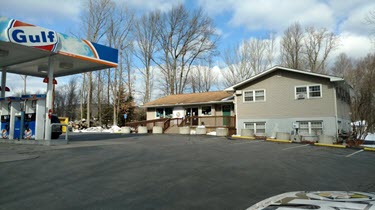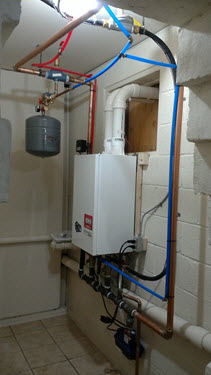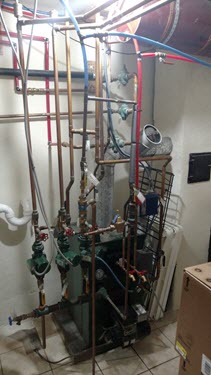Kunkletown, PA Homeowner Converts From Oil To Propane Heat
 It may seem unusual that our homeowner in Kunkletown, PA called us about his oil boiler in the spring. But, he didn’t think the heater would last another winter. And, he’d heard that propane could do the same job for less money.
It may seem unusual that our homeowner in Kunkletown, PA called us about his oil boiler in the spring. But, he didn’t think the heater would last another winter. And, he’d heard that propane could do the same job for less money.
He wanted to look into a replacement now, while he didn’t have to worry about having heat. It was especially important because he was considering changing energy sources.
Oil had always been his first choice. It’s delivered right to his property in bulk. This way, he never had to worry about problems with utility companies or broken lines running to his house. But, it was also getting expensive.
We went through the pros and cons of both heating sources. And, we discussed what sort of units would work in his home. Then, once he made his decision, we got to work.
Problem: An oil boiler in Kunkletown, PA was showing signs of breakdown. The homeowner wanted a new energy source that was clean burning and more efficient.
Solution: Installed a new wall-mounted propane heater.
Signs It’s Time To Replace Your Boiler
 Our Lehigh Valley homeowner knew the signs that his boiler might be headed for a breakdown. And, he knew how important it was to address the situation before the unit actually stopped working for good. By doing so, he saved himself a lot of time, money and frustration.
Our Lehigh Valley homeowner knew the signs that his boiler might be headed for a breakdown. And, he knew how important it was to address the situation before the unit actually stopped working for good. By doing so, he saved himself a lot of time, money and frustration.
Over the past two years, he’d noticed he’d been using more oil. The reserve was getting low more often.
At the same time, he wasn’t getting as much heat. The house had hold and cold spots, and sometimes just wasn’t warm enough overall. And, he’d had some problems with it already.
When he let us know his concerns, we asked the age of the unit. Our homeowner had it nearly 20 years, which is good for a condenser model such as this one. The old cast-iron tanks could last up to 50 years. But, we’ve seen these breaking down in as little as 15.
So, he decided to replace his unit immediately. It was a good decision because That’s because it’s likely the unit will break down in the dead of winter. That’s when it’s working the hardest.
But, winter is a busy time for HVAC companies. As a result, we often have a waitlist. If the heat isn’t working, however, people will want it addressed ASAP.
That usually means paying extra for premium, or priority service. And, if you need a replacement, you now have to very quickly choose a new unit into which you’ll invest a lot of money.
Fortunately, it wasn’t that cold when our homeowner spoke with us. And the heater still had some life left in it. Therefore, he could take his time deciding on just the right replacements.
Propane vs Oil Heat
 For his new heating system, our homeowner decided on clean-burning propane vs oil heat. The two have a few factors in common. Notably, he can store either energy sources at his home. This is in contrast to having them piped in continuously by a utility company.
For his new heating system, our homeowner decided on clean-burning propane vs oil heat. The two have a few factors in common. Notably, he can store either energy sources at his home. This is in contrast to having them piped in continuously by a utility company.
Rural areas such as Monroe County, and others in the Lehigh Valley, didn’t always have natural gas lines leading from a utility company to each house. And, electric heat isn’t always reliable. There are many wooded areas near these small communities. That results in frequent power outages due to downed power lines.
That’s why both sources are popular. With these energy sources, that’s not a concern. Instead, you get the fuel delivered to you in bulk. One delivery lasts for months. However, most of the similarities end there.
Two significant factors are clean energy and efficiency. That is, how many pollutants does each give off when burned? And, how much does each one cost?
On the environmental front, his new heating source wins out easily. It’s clean burning. That means it produces less carbon monoxide than other combustible fuels used for home heating. The same goes for other pollutants.
Next, it also doesn’t get sediment buildup in the tank, unlike oil. That’s notable especially if you’re not going to use your heating from a while. Less buildup means the piping will remain clear.
Finally, there’s cost. The prices for both rise and fall regularly. And, the comparisons get tricky because they are measured differently. Oil, a liquid, is measured in gallons. The other, a gas, is in cubic feet.
On paper, a comparable amount of oil will give off more heat. But, you also have to factor in efficiency.
Inevitably, some of the heat created by burning an energy source does not heat the home. Instead, it gets lost in the exhaust process. Between the two, oil loses more energy through the exhaust. That makes our homeowner’s choice of heating source more efficient.
Installing A New Heating Source
Now that our homeowner was confident about converting heating sources, it was time to get to work installing his new system. We would need to install some new lines along with just swapping out the heaters. Fortunately, this wasn’t a problem.
Our homeowner went with a small unit. It’s wall-mounted, unlike older heaters. This way, it takes up much less room in the basement. And, it won’t get damaged if there’s a small flood due to heavy rains. That’s because it’s a good three feet off the ground.
Next, there was a hatch window where we could vent the heater. From there, all we had to do was run the lines for various heating zones in the house. And, we ran piping for hot and cold water.
It was a big investment. But, over time the new unit will pay for itself in lower energy bills. And, we were able to to make the financial impact even softer.
Our homeowner qualified for zero-interest financing. This way, he’s paying just over $100 a month over time. It’s much easier than paying it all up front. And, he doesn’t need to pay extra in interest.
And, when you factor in lower energy costs, that amount is even lower when he does his household budget. Now, he’s got cleaner, more efficient heat than before. And, he doesn’t worry about his boiler breaking down in the cold weather.
Are you considering converting from oil to propane heat? Contact us, and we’ll find a system that’s perfect for you.
